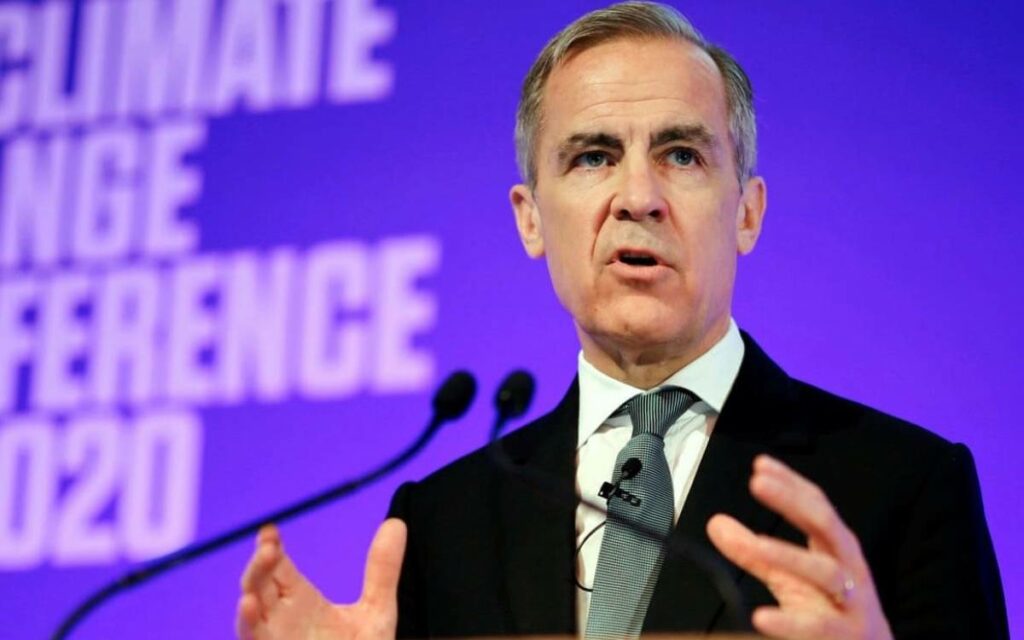
Former governor of both the Bank of Canada and Bank of England Mark Carney. Photo credit: Reuters/Tolga Akmen
The pre-COVID climate playbook and energy transition are in big trouble.
Not among climate crusaders. For them, the crisis continues.
It is the ordinary people who have more pressing issues.
War. Energy. Food. Inflation. Interest rates.
The cost and availability of energy has become more important than the source.
But some still worry.
Like Mark Carney, the famous former governor of the Bank of Canada and possible future leader of the federal Liberal party.
Carney is the public face of persuading the world’s financial industry to accelerate the end of fossil fuels by depriving suppliers of 85 per cent of the planet’s primary energy of the capital to sustain and grow their business.
This is based in part upon financial risk and the fiduciary obligations of those managing other people’s money.
Simply put, the energy transition will continually reduce the value of fossil fuels. The business term invented to describe this phenomenon is “stranded assets.”
Labelling fossil fuels as stranded assets indelibly brands them as risky. Because decarbonization will make them worth much less, possibly zero.
How could any responsible money manager finance commodities that “civil society” has declared to be on a one-way trajectory to obsolescence?
In 2017 Carney and Michael Bloomberg created the Task Force on Climate-Related Financial Disclosures. Companies, banks, investment funds and insurers should disclose the risks to investors if fossil fuel demand and prices decline.
Companies are obligated to advise shareholders of material changes.
Like the core business disappearing.
In 2019, Carney became UN Special Envoy on Climate Action and Finance. His mandate was to mobilize financial markets to pressure fossil fuel producers to change their behavior. This approach was necessary because consumers stubbornly refused to quit buying their products.
Last year Carney published a book titled, Values: Building a Better World For All. This outlined his master plan to save mankind from climate disaster.
Legendary business writer Peter Foster wrote a commentary June 5, 2021, for the National Post titled, “Mark Carney, man of destiny, arises to revolutionize society. It won’t be pleasant.”
“Carney’s plan is to control the global economy by seizing the commanding heights of finance, not by nationalization but by exerting non-democratic pressure to divest from, and stop funding, fossil fuels.”
Using capital markets, Carney would change energy supplies and costs for 7.9 billion people.
But his name appears on no ballot.
Carney’s crowning achievement at November’s COP 26 climate conference was the Glasgow Financial Alliance for Net Zero (GFANZ). GFANZ represented 450 international banks, insurers and asset managers representing US$130 trillion in assets. This included Canada’s big six banks. They pledged that climate change would factor into future investment decisions.
On April 23, The Globe and Mail published a commentary titled, “The climate fight is getting harder. Can Mark Carney keep his green finance push on track?” It called GFANZ “one of the marque announcements at the GOP26 climate summit.”
But the world’s energy complex has been upended by Russia’s invasion of Ukraine.
The article questioned how much Carney’s efforts mattered given the incredible changes in only nine weeks.
How can private companies continue to squeeze funding to non-Russian oil and gas producers when western governments have undertaken a complete reversal? The goal today is to replace Russian production with more fossil fuels from other countries. That requires money.
Carney said, “What’s happening today, because of the Russian invasion and the rupture in global energy markets, is we’re going to have to build in – it’s a question of how much – more stranded assets, effectively in the system because we’ll develop other sources of hydrocarbons to displace Russian oil, Russian gas.”
The stranded asset description continues.
But anyone who has not made a career out of centrally planned decarbonization would conclude it is only Russian fossil fuel assets that have been stranded by international decree and public opinion.
The value of rest of the world’s coal, oil and gas has soared. In 2022 many of the outfits that ratified GFANZ have revalued North American oil and natural gas at twice its average price for the previous seven years. Coal has tripled.
When oil prices began rising, U.S. President Joe Biden asked Iran, Venezuela, UAE, Saudi Arabia and U.S. producers to “un-strand” their petroleum as soon as possible to cap fuel costs.
Carney continued, “We do need some investment in fossil-fuel financing and fossil fuels during this period of transition, but it is a very limited number, and its needs to be anchored in pathways that are consistent with the carbon budget.”
Who will decide? What will the acceptable sources and prices be?
RBC, Canada’s largest bank and a GFANZ signatory, recently released a report titled A New Climate Bargain. It explained how Canada could increase oil production by 500,000 barrels per day to replace Russian crude without compromising long term climate objectives.
Maybe.
The Financial Post’s coverage of RBC’s report was titled, “Ukraine crisis reveals hard truth that the world isn’t ready for the energy transition.” RBC’s first section is titled, “Oil is here for the long haul.”
Rendering fossil fuels obsolete was conceived in a different environment than the one we live in today.
That was Mark Carney’s world, and he was a star.
But in our tumultuous new world, does Mark Carney’s stranded asset definition still mean anything?
David Yager is an oilfield service executive, oil and gas writer, and energy policy analyst. He is author of From Miracle to Menace – Alberta, A Carbon Story. This article first appeared on the Canadian Energy Centre website on Apr. 29, 2022.
David Yager is an energy policy analyst and oil and gas Writer. Since 1979 he has been a regular contributor and commentator in trade magazines and newspapers and on radio and television on business, economics, politics and public affairs. This column originally appeared at energynow.ca




















